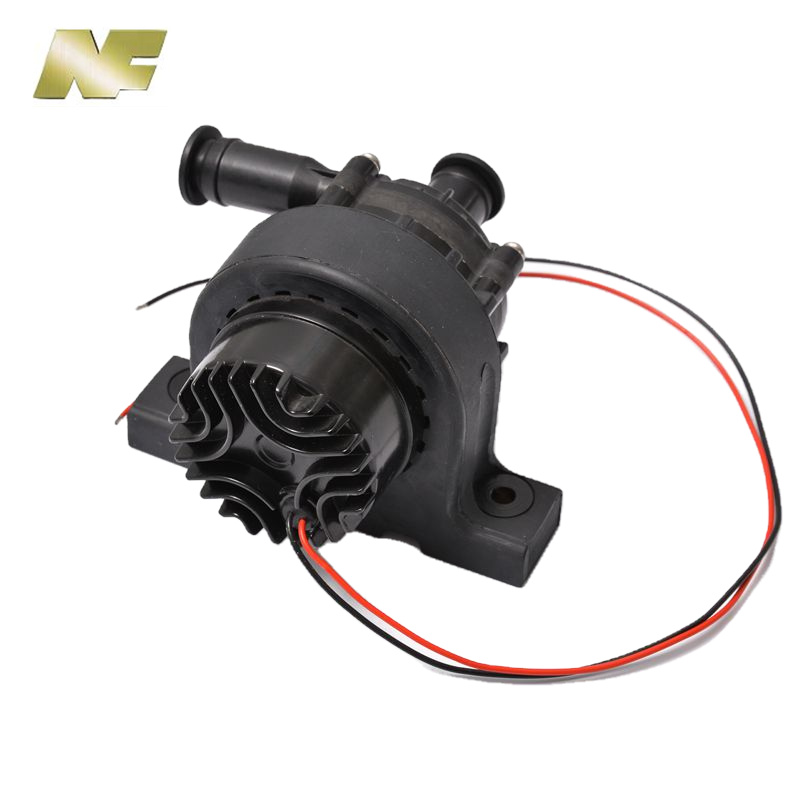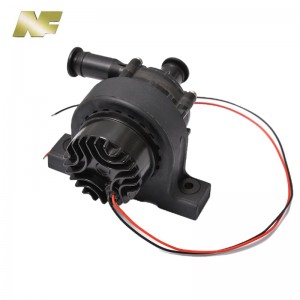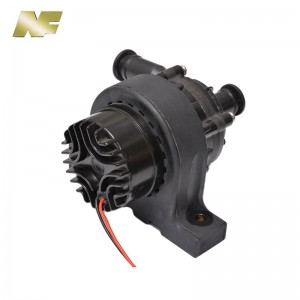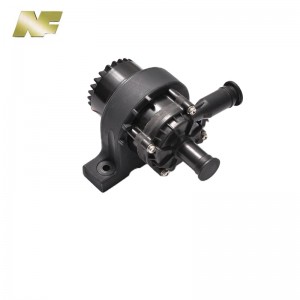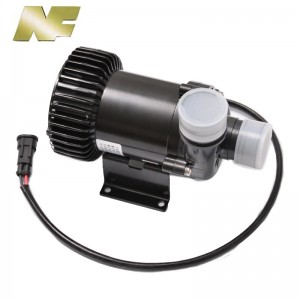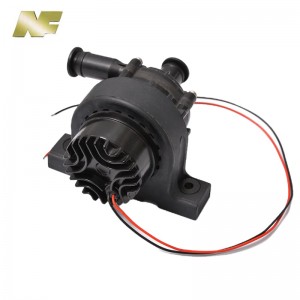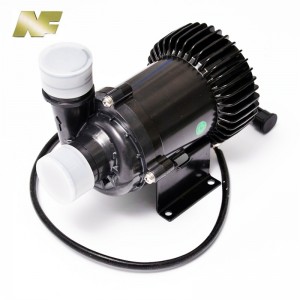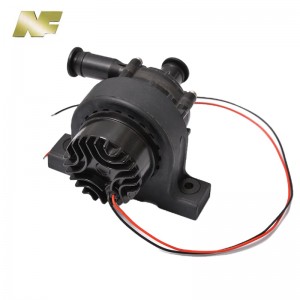NF Best Sell Electric Bus E-Truck 80W DC12V Electrical Water Pump Coolant Pump
Description
In the world of automotive technology, countless innovations have revolutionized the driving experience. The electric water pump for cars is one such marvel. Designed to effectively regulate coolant flow, these devices play a key role in maintaining optimum engine temperatures. Today, we delve into the world of automotive electric water pumps, explore their benefits and examine their importance to vehicles, especially buses.
What is unique about electric water pumps for cars?
Automotive electric water pumps have proven to be an excellent addition to modern vehicles, offering advantages over traditional mechanical water pumps. These pumps are powered by electricity, increasing efficiency by eliminating the continuous mechanical resistance often found in conventional water pumps. Additionally, their direct control and management of coolant flow enables precise temperature regulation, enhancing engine performance.
Improvement of passenger car cooling system:
Efficiently operating cooling systems are essential for bus transportation. The high demands on passenger car engines, combined with the long operating hours, necessitate the installation of reliable electric water pumps. Automotive electric water pumps designed for passenger cars provide higher coolant flow and powerful performance, providing the necessary support to prevent overheating and potential engine damage.
12v Car Electric Water Pump: A Game Changer:
The advent of 12V electric water pump automotive technology has further revolutionized vehicle cooling systems. These pumps are powered by the vehicle's 12-volt electrical system for added versatility and ease of installation. With their compact design, they fit seamlessly into a variety of car configurations, making them ideal for commercial and private vehicles.
in conclusion:
To sum up, electric water pumps in cars have become an important component in ensuring optimal temperature regulation of the engine. These pumps provide increased efficiency, precise control and reliable coolant flow and represent a significant advancement in automotive technology. Especially for buses, automotive electric water pumps provide vital assistance in maintaining a reliable cooling system for safe and efficient operation. With the advent of 12V electric water pump automotive technology, the possibilities for enhancing vehicle performance and engine protection are endless. Embracing these innovations is essential for every vehicle owner seeking the best in engine function and longevity.
Technical Parameter
|
Ambient Temperature
|
-40ºC~+100ºC
|
|
Medium Temp
|
≤90ºC
|
|
Rated Voltage
|
12V |
|
Voltage Range
|
DC9V~DC16V |
|
Waterproofing Grade
|
IP67 |
|
Service life
|
≥15000h
|
|
Noise
|
≤50dB
|
Product Size
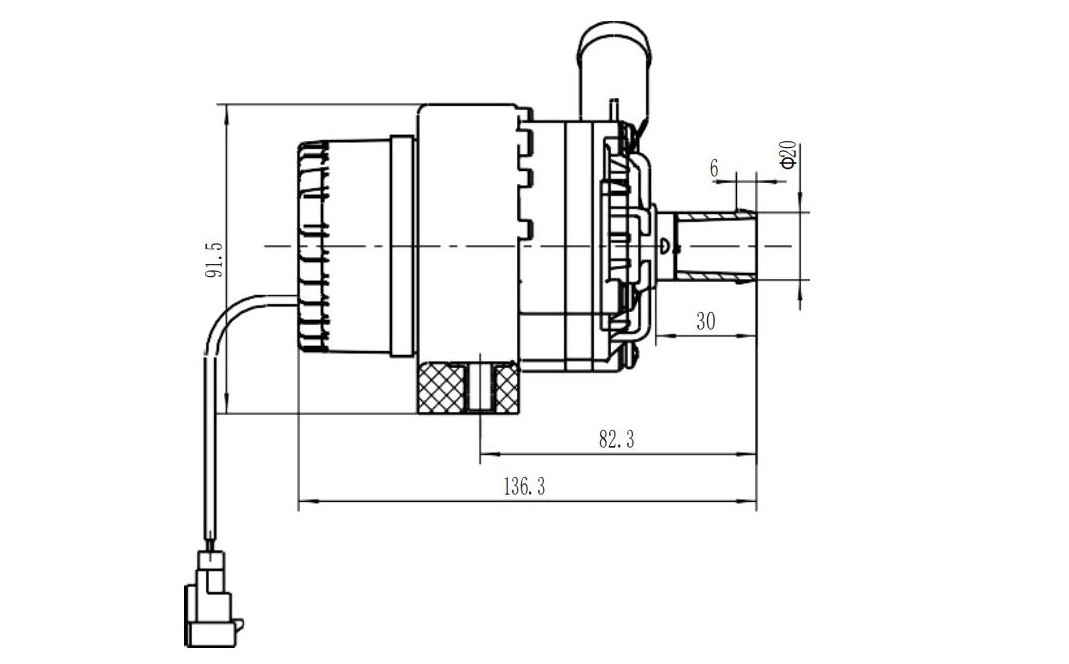
Advantage
1. Constant power, the voltage is 9V-16 V change, pump power constant;
2. Overtemperature protection: when the environment temperature over 100 ºC (limit temperature), water pump stop, in order to guarantee the life of the pump, suggest installation position in low temperature or air flow better;
3. Overload protection: when the pipeline has impurities, cause the pump current increases suddenly, the pump stop running;
4. Soft start;
5. PWM signal control functions.
Our Company
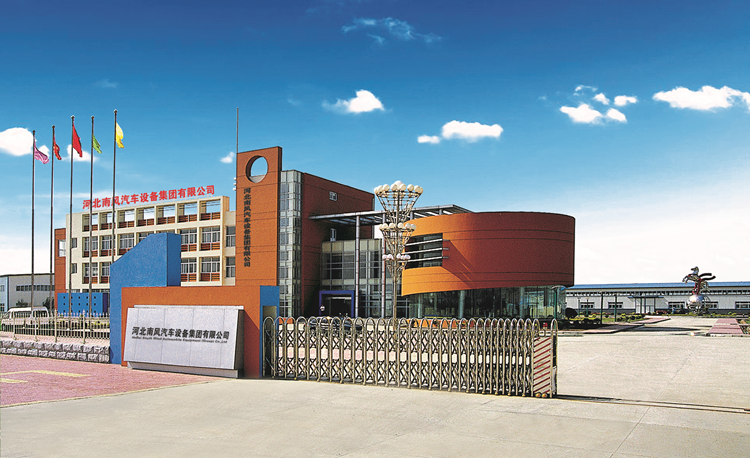

Hebei Nanfeng Automobile Equipment (Group) Co., Ltd is a group company with 5 factories, that specially produce parking heaters, heater parts, air conditioner and electric vehicle parts for more than 30 years. We are the leading auto parts manufacturers in China.
FAQ
1. What is the purpose of the water pump in the electric bus?
The function of the water pump in the electric bus is to circulate the coolant in the cooling system to maintain the optimum working temperature of various components and ensure their service life.
2. How does the water pump on the electric bus work?
The water pumps in electric buses are usually driven by electric motors and operate by creating pressure to circulate coolant. As the pump spins, it pushes coolant through the engine block and radiator, effectively dissipating heat.
3. What are the benefits of using water pumps in electric buses?
Water pumps play a vital role in preventing overheating and maintaining the efficiency and performance of electric bus components. By constantly circulating coolant, they help regulate temperature and avoid potential problems caused by overheating.
4. What should I do if the water pump of the electric bus fails?
If the water pump in an electric bus fails, coolant circulation stops, causing components to overheat. This could cause irreversible damage to the engine, motor or other critical components, leading to costly repairs and potentially rendering the bus inoperable.
5. How often should the water pump of the electric bus be checked and replaced?
Specific inspection and replacement intervals for electric bus water pumps may vary based on the manufacturer's recommendations. However, regular inspections are generally recommended as part of routine maintenance, and replacement may be required if signs of wear, leaks, or performance degradation are found.
6. Can aftermarket water pumps be used on electric buses?
Aftermarket water pumps can be used on electric buses, but compatibility with the specific model and requirements of the bus must be ensured. Consultation with a reputable manufacturer or supplier is recommended to ensure proper installation and performance.
7. How to identify a faulty water pump in an electric bus?
Signs of a water pump failure in an electric bus may include coolant leaks, engine overheating, unusual noise from the pump, low coolant level, or reduced cooling system performance. Signs of any of these symptoms should prompt immediate inspection and possible replacement of the water pump.
8. What maintenance techniques can prolong the service life of electric bus water pumps?
To prolong the life of your electric bus water pump, regular maintenance is essential. This includes checking the coolant level, checking for leaks, ensuring proper belt tension, and following the manufacturer's recommended maintenance schedule. It's also important to address any issues promptly to prevent further damage.
9. Can the water pump on the electric bus be repaired?
In some cases, it may be possible to repair the water pump in an electric bus, depending on the extent of the damage and the availability of replacement parts. However, if a major problem is found, it is usually more cost-effective and more reliable to replace the water pump.
10. How much does it cost to replace the water pump in an electric bus?
The cost of an electric bus water pump replacement can vary, depending on factors such as the specific model, manufacturer, and parts availability. It is recommended to consult a qualified mechanic or contact the coach manufacturer or authorized service center for an accurate cost estimate.

